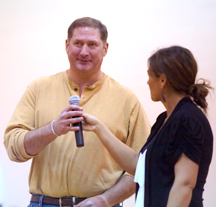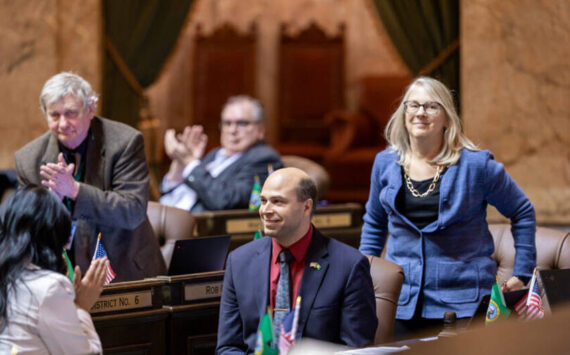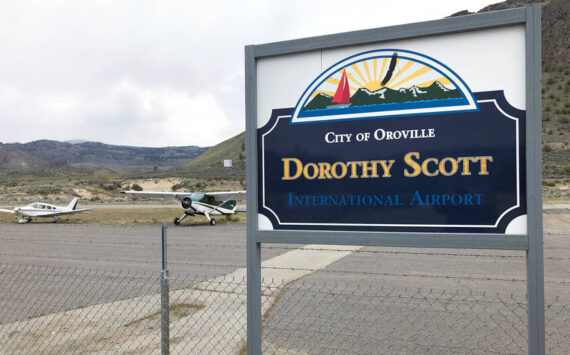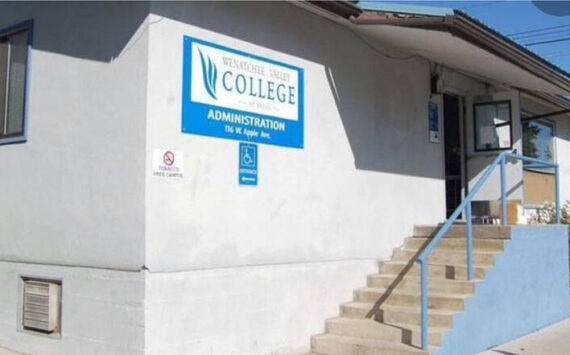
Veterans Service Officer Shane Barton answers questions about his military career at the Tonasket Middle School Veterans Day assembly on Nov. 10. Photo by Brent Baker
It’s no secret that Okanogan County is home to thousands of U.S. Armed Forces veterans.
It’s Shane Barton’s job to make sure that services available to those veterans become much less of a secret, or at least more widely known to those who are entitled to them.
Barton, the Veterans Services Officer at the VA Clinic at Tonasket’s North Valley Hospital, has seen explosive growth since he was hired in June. What began as a three-day-a-week, four-hour-a day, part-time job rapidly turned into something much bigger. The position will turn full-time in January, but Barton said he is already putting in full-time hours.
“Mike Stewart and Dale White, who are both disabled Viet Nam veterans, saw how many veterans were in the area, and there were no services available at all,” Barton said.
Stewart and White worked for several years to get the VA to authorize a contract for a rural clinic. The clinic itself opened in January, but it quickly became apparent that it would take more than a volunteer effort to keep it running effectively.
“They got the county, through the county commissioners, to authorize an employee here,” Barton said. “And when I took that over, we just saw how much bigger the need was than anyone realized.”
Barton’s office hours are 9 a.m. – 4 p.m. Monday through Friday, but as he said, “I get calls on nights and weekends. I got one call while I was in Idaho helping my sister buy a car. A veteran had passed away, and there were funeral arrangements that I needed to make from there.
“I love the flexibility of this job, though. If someone calls from Omak and I need to go visit him at his home, I can do that.”
Not only has there been a far greater need than anyone anticipated, but the demand has meant that the VA clinic’s menu of services has expanded and will likely continue to grow. The clinic had brought in more than double its anticipated revenue by the end of September.
“One of the biggest things is getting the word out that we have a clinic here,” Barton said. “As long as we can keep new patients coming in, it’s more profitable than seeing civilian patients, and as long as it’s more profitable then it can stay open and grow.”
Mental health counseling, especially for veterans trying to adjust to a return to civilian life, is the newest service the clinic offers. And vocational rehabilitation, once limited to disabled veterans, is now available to all veterans.
It’s part of the VA’s goal to end veterans’ homelessness by 2015, which can be best achieved by helping them find jobs.
“The more veterans we have signed up, the more need the VA sees in the community,” Barton said. “That’s what helps us open more services. For example right now we can’t do hearing aids or eyeglasses, and it would be nice to be able to get an optometrist and a hearing specialist here.”
Barton said that he hopes to see the clinic expand into a full-service office that would include transitional housing, drug and alcohol abuse counseling, more mental health services and job assistance. The benefit to the veterans, he said, would benefit the surrounding communities as well.
“If we can get grants for those kinds of services, it brings money into the community,” Barton said. “If we can get the veterans receiving the benefits they’re entitled to, that’s money that can be spent here.
“There’s a lot of benefits that veterans don’t know about and that’s the big reason we’re here. Around here we have a lot of veterans up in the mountains with no TV, no news, they don’t get newspapers, so they don’t know what they are eligible for.”
Barton said he had one decorated veteran of Viet Nam and Korea come in for health care, and by doing so discovered that he was also eligible for a $2,000 a month retirement benefit.
“He said he hadn’t ‘done anything,’ so he had no idea,” Barton said.
The success of the NVH clinic has gotten plenty of attention outside the area. Barton said it has served as a model for similar clinics being set up in Grant and Stevens counties, as well as the Yakima Indian Nation. He’ll be speaking to the House of Representatives in Olympia in January and the U.S. Senate Committee on Veterans’ Affairs recently contacted him.
“I got called because they had heard about our little project here from D.C.,” Barton said. “They had some questions as to how it’s working out and they offered help. I’m going to try to fly back to D.C. next summer to talk to them about it.
“The more we get our name out, the more we draw our attention to ourselves, when it comes time to ask for money – we’re getting ready to ask for a bunch – it makes it that much easier.”
And as far as Barton is concerned, the benefits the VA clinic provides could be the difference between life and death for the men and women who have served the nation in uniform.
“More Viet Nam veterans committed suicide than actually died in combat,” he said. “We have so many kids now that are fighting in Afghanistan and Iraq. We need to make sure that never happens again.”
Barton, himself a disabled war veteran, graduated from Tonasket High School in 1987, served with the U.S. Army 10th Special Forces for nearly a decade, and subsequently managed eight car dealerships on the west side of the state.
“I ran a multimillion dollar business for 15 years, and this is very much the same on a smaller scale,” Barton said. “Believe it or not, that was the best possible training for this job. In car sales, it’s the follow-up phone calls and calling the banks to yell at them for not providing what you need. Here it’s the follow-up calls to the veterans and calling the VA to yell at them because they’re not providing the right services.
“It prepared me more than I realized when I started here.”
With the downturn of the economy, Barton found himself moving back home, not knowing what the future held.
“I moved back here without a plan,” he said. “I saw the job opening and after I interviewed I got the job offer call before I even got to my car in the parking lot. Other people had interviewed, but I think my business experience, as well as being a veteran, made a big difference.
“I was a bit of a hellion as a kid here. So it’s really nice to be able to come back and give to the community.”
Barton can be reached by phone at (509) 486-3177.




